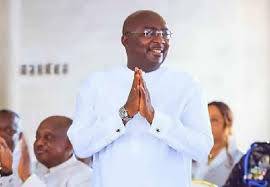Bawumia’s Defeat in Ghana’s Presidential Election: A Pivotal Moment in the Nation’s Political Landscape.
Today, Ghana witnessed a dramatic turn in its political narrative as Vice President Dr. Mahamudu Bawumia, the flagbearer of the ruling New Patriotic Party (NPP), lost in the closely contested presidential election. The result has sent shockwaves across the nation, marking a significant shift in Ghana's political dynamics and setting the stage for intense political reflections.
Dr. Bawumia's defeat comes despite his position as the sitting Vice President, a role that gave him considerable visibility and influence. His campaign, centered on economic transformation, technological innovation, and unity, appeared poised to capitalize on his reputation as an astute economist. However, the election outcome suggests that voters prioritized other concerns, including the current administration's performance and the appeal of the opposition’s message.
The Road to the Election
The 2024 elections were a highly anticipated contest, with Dr. Bawumia facing a formidable challenge from John Dramani Mahama of the National Democratic Congress (NDC). Mahama, a seasoned politician and former President, campaigned on a platform of change and addressing what he described as the failures of the current administration. The NDC's strategy of emphasizing issues like unemployment, corruption, and public service inefficiencies appeared to resonate strongly with the electorate.
Dr. Bawumia’s campaign had focused on his accomplishments, particularly his role in promoting digitalization in Ghana. The introduction of initiatives like the Ghana Card and mobile money interoperability were touted as significant achievements. However, these advancements were overshadowed by growing economic hardships, including inflation, a depreciating cedi, and rising public debt, which became central to voter dissatisfaction.
Key Factors Behind the Loss
1. Economic Challenges: While Dr. Bawumia was hailed for his economic expertise, the realities on the ground painted a different picture. Ghana has faced significant economic struggles in recent years, and many voters attributed these challenges to the current administration’s policies. Rising costs of living, unemployment, and public debt eroded public confidence in the government’s ability to deliver economic stability.
2. Voter Sentiment and Anti-Incumbency: The election underscored the strong anti-incumbency sentiment among Ghanaian voters. Many believed that the NPP had not lived up to its promises of creating jobs, ensuring equitable development, and tackling corruption.
3. NDC’s Campaign Strategy: The NDC’s ability to galvanize support, particularly among the youth and rural populations, played a significant role in their victory. Mahama's message of change and his promise to address systemic issues struck a chord with many Ghanaians who felt neglected.
4. Ethnic and Regional Dynamics: Ghana’s elections often involve complex ethnic and regional considerations. Despite Dr. Bawumia's Northern roots, which were expected to garner widespread support in the region, voter turnout and preferences did not align entirely with these expectations.
Implications for Ghana’s Future
Dr. Bawumia’s loss signals a critical juncture for the NPP. The party must reflect on its governance approach and reevaluate its connection with the grassroots. It also raises questions about the future of Dr. Bawumia’s political career and the party’s strategy in subsequent elections.
For the NDC, this victory is a mandate to deliver on their promises. Mahama’s administration will face immense pressure to tackle the pressing economic challenges and fulfill the expectations of a populace yearning for tangible improvements in their daily lives.
The election outcome also serves as a testament to Ghana’s vibrant democracy. Despite intense competition, the electoral process was conducted peacefully, further solidifying Ghana's reputation as a beacon of democratic stability in Africa.
Conclusion
The defeat of Dr. Mahamudu Bawumia in today’s election marks a transformative moment in Ghana’s political landscape. It reflects the aspirations and frustrations of the Ghanaian people and their desire for leadership that aligns with their needs. As the dust settles, both the victorious NDC and the NPP have significant roles to play in ensuring that Ghana continues on its path of progress and unity. For now, the focus shifts to the incoming administration and its capacity to address the nation’s challenges while fulfilling its promises of hope and change.


